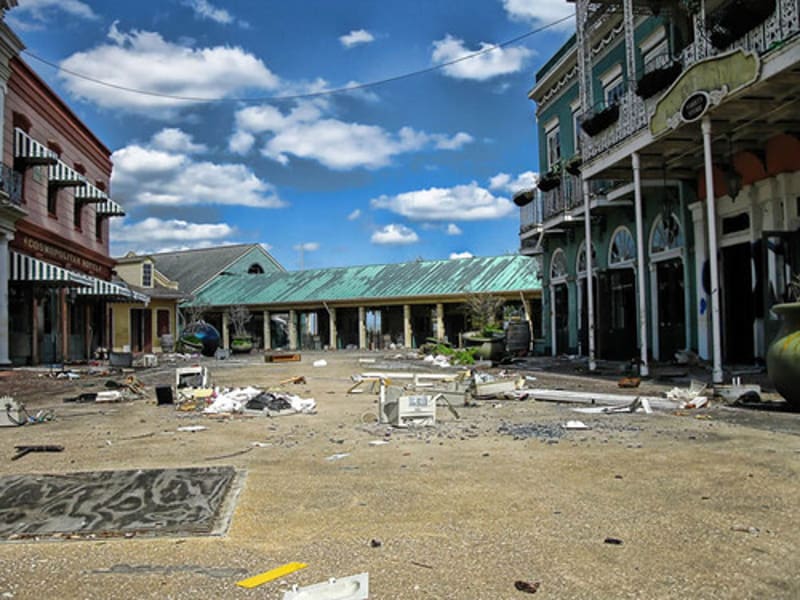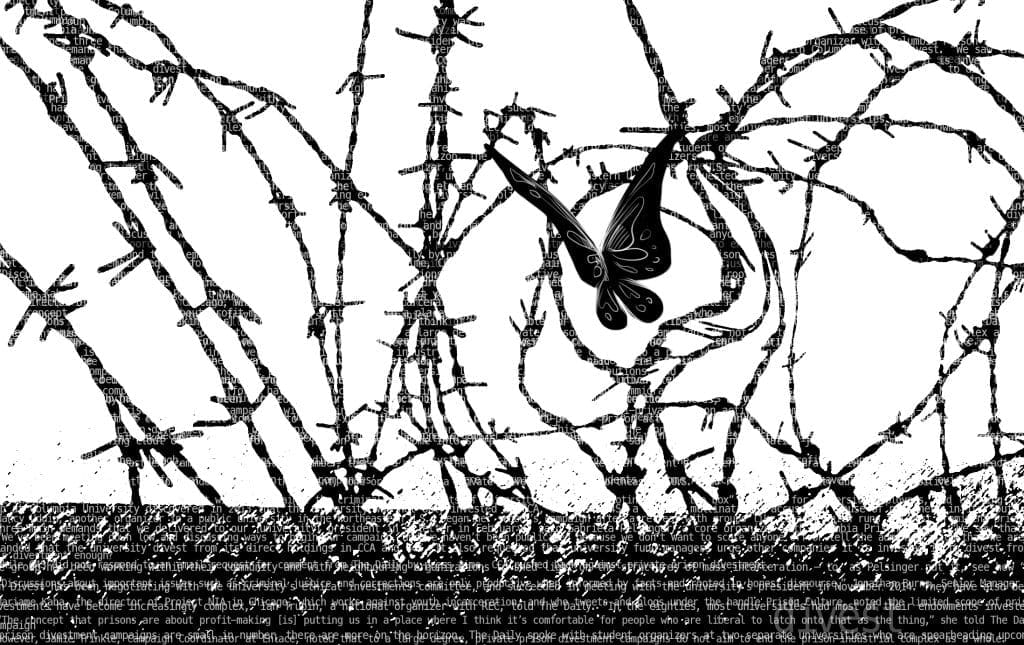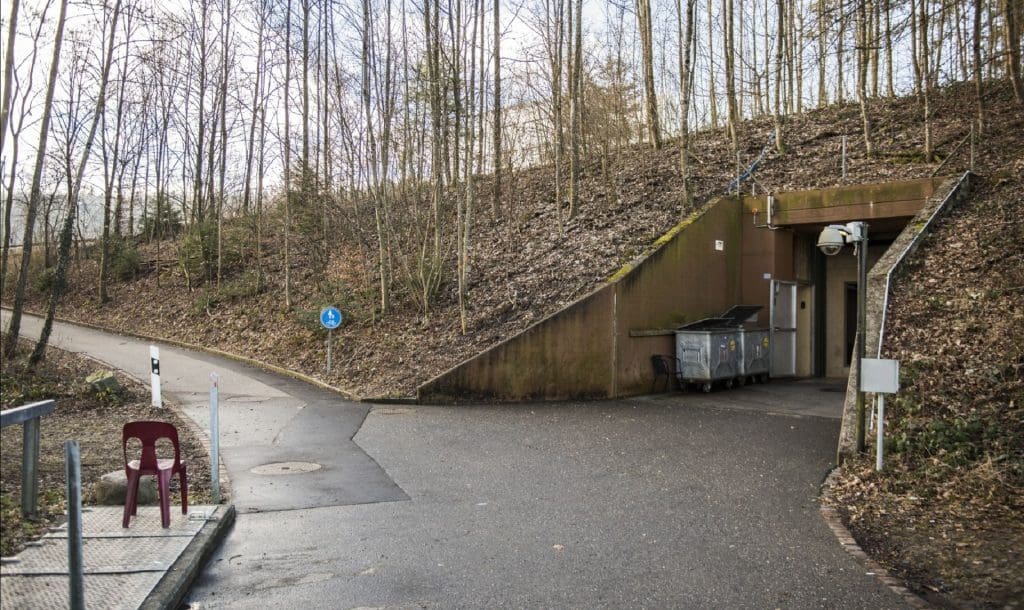Transcribed from the 18 January 2014 episode of This is Hell! Radio (Chicago) and printed with permission. Archived audio to be made available online eventually.
Squatting is a common practice since Katrina. Everyone knows someone who has done it. It’s a tacitly acceptable part of the culture.

 Chuck Mertz: We are speaking with Spencer “Thunderball” Thayer, producer on This is Hell! He was a correspondent on our show before he was a producer; he is now going back to his correspondence ways. He now lives in New Orleans, so now we have a correspondent in New Orleans.
Chuck Mertz: We are speaking with Spencer “Thunderball” Thayer, producer on This is Hell! He was a correspondent on our show before he was a producer; he is now going back to his correspondence ways. He now lives in New Orleans, so now we have a correspondent in New Orleans.
Sarah Kendzior was on just a little while ago, talking about how the centers of creativity are cut off from people nowadays—her big example was New York City, but also San Francisco. They’re cut off from young people, especially artists and the creative class, because they have become places for only the 1%. Essentially artists are being priced out of the artistic centers of the United States. I know that when you and the fabulous Mrs. Thunderball were thinking about where to move—you wanted to get out of Chicago, you wanted to try something else—I know that you had an opportunity in New York City. Why did you choose New Orleans over New York City?
Spencer Thayer: Well, our primary goal has been to avoid participating in capitalism as much as possible. And to do that, we decided the first thing we needed to take control over is our food. We wanted to grow our own food. We started doing that in Chicago and we were exceptionally successful, I would say maybe 50% of our food was grown on a rooftop at Weiss Hospital.
And New Orleans was the ideal place, because it’s growing season all year round. And there is still culture and activity and a nightlife. And also, it’s cheap—at least we thought it was cheap. But there’s an interesting correlation between what your previous guest was saying and what I’m going to talk about a little bit today, how New Orleans is starting to get priced out for the creative class, or just working people and people of color. Everyone is getting pushed out, deliberately, by the city and by real estate speculators.
CM: Okay, tell us what’s happening. What have you found through your attempts to start up your farming situation, in your search for a home?
ST: Like I said, Tegan and I decided that we wanted to leave Chicago because we wanted to grow our own food. Essentially that was the key to our new life. We studied real estate prices in Portland, Oregon, and Portland, Maine, actually, and so we considered the cost of what it would take to grow things with a greenhouse in various different climates.
When we were doing our research last year, ultimately the price factor for New Orleans was a clear winner. It had a booming culture, it had the right temperatures, and the right soil. Though a lot of people in the North assume that the soil in New Orleans is contaminated, it’s really not. It’s a sand bed, so it gets rid of contamination fairly quickly—the EPA and other environmental protection groups have mapped soil toxicity all over. It’s actually quite easy to take existing soil, turn it into mulch, put some additional topsoil onto it and turn that into a legitimate bed for growing, with very minimal cost.
So we moved to New Orleans. We did most of our research a year ago, and we did not assume that anything would change, but it turns out that Warren Buffett said that New Orleans was the hottest prime real estate in the country, the best investment you could make.
So there’s a house that Tegan and I were interested in a while back; we came to New Orleans, saw the place. In 2009 it was purchased by the current owner for $19,000—and now it’s selling for $69,000. In just a few years it’s jumped, and no renovations were made. In 2012 it was rated as a house worth $26,000. Now it’s $64,000. And for no reason whatsoever; the market had just artificially inflated. Because real estate agents from Nashville, Atlanta, Texas, most of the states surrounding Louisiana have invested tons of capital into the system. And they’re buying ads, they’re paying new interest groups to go into New Orleans and lobby for changes in regulations. They’re doing all sorts of things to “improve,” in their opinion, the infrastructure and make a buck.
But it’s driving people out who legitimately want to live in New Orleans, make New Orleans a better place not just for newcomers and rich people, but for everyone. The cost is just too high. So now we’re in this strange limbo; we actually don’t know what we’re going to do. We only have a meager amount of money. We thought that we could probably pull it off in New Orleans, it’s like buying property in Detroit—at least it was—where you could invest a small amount of capital, get a very moderate place, nothing good, but it would be home, it would be a great place to live. But now those really meager houses are out of our price range.
There are other options we can take. There are a lot of abandoned houses, and basically what you do is break into a house, take it over, and then start paying taxes on it. Then a couple years later you can sue for the right to live on the property. I’ve met a couple of people that have done this in the past. And I think that’s probably the route that we’re going to end up taking.
CM: And you’ve done that before, though—you did that in Springfield, didn’t you?
ST: I’ve squatted in a lot of places. I’ve squatted in St. Louis. Squatting is actually quite easy, as long as the property owners don’t call the police on you. If it’s an abandoned house and fairly run-down, it’s very easy to squat. The problems of squatting are of course utilities. You have to either steal utilities by turning on the water yourself—which is actually easier than most people would think—or get some sort of water tank outside and put it through the house, but that’s a lot of work. It’s easier to just find wherever the water’s turned off and just turn it on yourself.

CM: How do folks in New Orleans feel about squatting right now? How do the police feel, how does the citizenry feel? Do they think it’s just people carpet-bagging, or do they think that these are actually people who are trying to help out the city?
ST: Squatting since Katrina has become a regular thing. There has been a lot of displacement, and the majority of the housing projects in New Orleans were shut down. There is one—it was built similarly to a military barracks in the 1940s, it was really well-made. It’s this beautiful place, and it’s huge. It’s enormous, it’s like several blocks. And it’s all gated off and no one can access it. It’s a shame because they’re perfect houses and hardly any of them have any mold problems.
So when you have that much displacement—of course a lot of people never came back, but there’s still a significant number of people who lived in New Orleans and stayed in New Orleans, and they just squatted in other places, other abandoned houses. It is a common practice, since Katrina, to start paying taxes and sue later to get your property. It seems like everyone does it. At least everyone knows someone who has done it. It’s a tacitly acceptable part of the culture.
CM: So what do you notice more when you’re in New Orleans? The economic devastation of the city or the environmental devastation of the city from Katrina?
ST: Well, it is a city, so it’s difficult to look at the ecological devastation and distinguish between Katrina and just people throwing trash out or dumping oil from their car. It’s not a clean city. It’s one of the dirtiest cities I have lived in. But with that said, I think it is significantly dirtier than it should be because of Katrina.
The economic devastation post-Katrina is very clear. There are neighborhoods that are beautiful. And then there are all sorts of neighborhoods that are not. There’s still mold growing in many, many houses. People are living in these houses. And it’s been many years—most mold should be taken care of within a year of discovering it. It’s very clear that there are certain groups in New Orleans who are doing better than they had before—and of course the inverse is absolutely true.
Because I’m an outsider, it’s very difficult for me to pinpoint what’s because of Katrina and what’s because of real estate speculation. But I’ve been talking to a lot of people, and anecdotally I can say that at this point it’s mostly real estate speculation.
CM: As you were saying at the beginning of this conversation, one of the reasons that you moved to New Orleans was to get back to community farming, like you were doing over at Weiss Memorial Hospital on Sheridan here in Chicago. What has been your experience in New Orleans, when it comes to community farming? What have you encountered? Are there places for you to grow? What’s the current situation in New Orleans? Do people embrace the idea of community farming? I know that it is being embraced whole-heartedly in Detroit, for example.
ST: It’s really popular here in New Orleans. It’s so popular, in fact, that real estate speculators and other people who don’t like that sort of thing have already started working against it.
There’s a group called Growing Local NOLA, who are probably going to be the people we end up participating with until we have our own property—and they’re wonderful. They just recently broke new ground in Central City, which is very close to Mid-City where we live right now. It’s close enough, it’s a bike ride away. And they’re great. They’re doing wonderful things.
The interesting thing about New Orleans is I’ve never seen so many community farms. A lot of community farms in Chicago have signs in front of them, and their sponsorships are listed at the bottom. But these are just lots that people have taken over and started farming. These are neighborhood farms that have no authority, there’s no corporate sponsors backing them or even the equivalent of a Chicago alderman backing them. It just exists because it was an empty space, and it’s being used to feed the random people who live there and who decide to participate in it. I love that.
And I knew that a culture of land-reclamation existed in New Orleans, because I experienced that the previous time I was here, before Katrina, and I thought it was very impressive. Actually that was the first time I’d ever seen people participating in growing their own food. This was in 2001.
But urban renewal advocates have just recently passed something called the Comprehensive Zoning Ordinance. Essentially what it does is limit what you can do with land if you’re going to grow stuff. It limits the amount of livestock per square foot, it limits the kind of plants that you can plant. You can’t plant certain plants or certain seasons, it’s very strange.
CM: Spencer, always great to hear your voice. Say hello to Tegan for me. Take care.
ST: Miss you!





